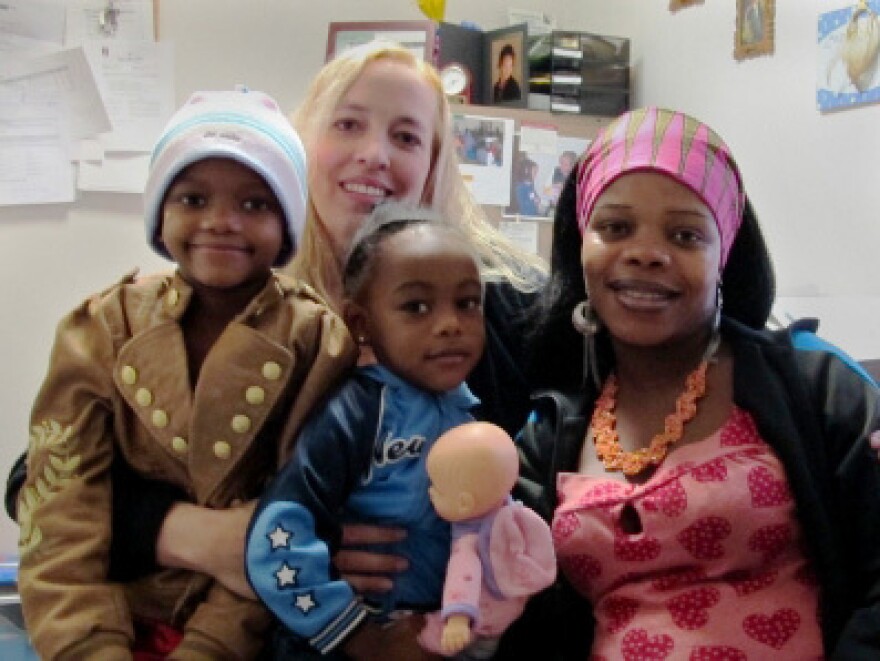In the last few years, more than 4,000 refugees have found their way to a far-flung spot: Idaho. Most of the state's incoming refugees come to Boise. For years, the city's strong economy, good-quality affordable housing and supportive community created an especially favorable environment for refugee resettlement. The recession has shifted that picture.
Nowela Virginie and her two young daughters spend most days in her small apartment just off a busy thoroughfare on the outskirts of Boise. Virginie is 23 and arrived in Boise three years ago. She was born in Rwanda, but spent 16 years of her life in a refugee camp in Tanzania. She remembers the shock of finding herself in a new city, a place that looked nothing like anywhere she'd ever been.
"When I coming USA, nobody can explain to me how USA is to look like, nobody can explain to me," she says. She says even the buildings didn't make sense to her. What were they? Was that a house or a business?
Right now, her most basic hope is finding find work. But, as Virginie herself knows too well, that's a huge challenge.
"You know, new country is supposed to be hard. New language, everything is new. But if you have a job, you have education, is not hard, is good," she says. "But the bad thing, if you don't speak any English, is so hard --really hard."
Suddenly, Families Struggled
All of that is compounded by an economic downturn that has eliminated many of the entry-level positions that might have been possibilities for Virginie not so long ago. She's not alone, says Marcia Munden, a social worker with Catholic Charities of Idaho.
"Three years ago, we were just seeing a few extreme cases of refugees that had consistent difficulty with integration, and then it really happened very suddenly, where there were 50, 60, 100 families really struggling," she says.
Munden and Virginie met two years ago. By then, the eight months of medical and financial assistance Virginie received as a refugee arriving in the U.S. had expired. Virginie managed to find work cleaning hotel rooms, but her hours depended on the number of rooms to be cleaned and usually there weren't many. Plus, Munden says, there was the problem of day care for Virginie's children.
"She would have to get them over there, pay for the time that the day care requires that you pay for, and then show up to work and possibly only work a partial shift," she says.
As a result, the day care bill was sometimes hundreds of dollars more than her paycheck. Eventually, Virginie had to quit.
Nationwide, Resettling Gets Harder
The recession has complicated the hard task of refugee resettlement nationwide. The shift is especially stark in Boise, because the city has long been regarded as a good place for refugees to put down new roots.
"Boise was particularly favorable, yes," says Bob Carey, who oversees resettlement and migration policy for the International Rescue Committee. Carey's based in New York, but the IRC has a Boise office, too, opened in 2006. At that time, Idaho had the fastest growing economy in the country, and unemployment in the Boise area was under 3 percent.
"It was a very strong employment market, and there were certainly many jobs available for refugees at the entry level when they arrived in Boise," he says. "So for those people who were able to work, we could generally find them jobs that would allow them to support themselves within 90 days."
Now, Boise is one of the places where the IRC has reduced the number of refugees it aims to resettle each year, cutting back by about a third. In addition, it and other local agencies that help refugees find work have adopted new strategies.
No Guarantees, Even For Refugees
"We've looked at other ways of opening doors that we've never had to look at before," says Jan Reeves, who heads the Idaho Office for Refugees.
For example, he says, they've looked farther afield, finding jobs for a number of refugees at a dairy in Oregon. The efforts appear to be paying off. Before the recession in 2005, 95 percent of the office's employable caseload found work. That dropped to 55 percent in 2009. It has since gone back up to more than 70 percent. Yes, there are refugees who are not making it, Reeves says, but it's important to think about what the resettlement program offers and what it doesn't.
"The refugee resettlement program provides an opportunity for people to achieve a level of protection from violence and torture and other forms of persecution," he says. "But the system in our country does not provide a guarantee that everybody will be well taken care of."
That, he says, is an unfortunate reality.
Despite the clear difficulty of Virginie's situation, there's room for hope. Virginie and her daughters have been lucky to get subsidized housing, at a moment when many waiting lists are closed. And Virginie recognizes that her children already have opportunities she never did.
"You know, I'm so happy because my daughter, my big daughter, Odille, she speak English now," Virginie says. "She's in the kindergarten, but she speak really good English."
"My teacher said we're almost first-graders," Odille says. She offers to sing a song and launches into "I'm Bringing Home a Baby Bumblebee." It's a tune familiar to most any American kid.
Copyright 2021 NPR. To see more, visit https://www.npr.org.



